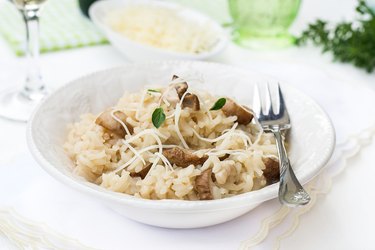
Disulfiram, sold commercially as Antabuse, helps people stop drinking alcohol by causing an unpleasant physical reaction after consuming alcohol. Antabuse causes blurred vision, chest pain, confusion, dizziness, flushing, headache, nausea, vomiting and weakness if taken within 12 hours after consuming alcohol, Drugs.com states. Antabuse can stay in your system for up to 14 days, so reactions can occur any time you consume alcohol within two weeks of your last dose. While no foods naturally contain alcohol, a number of commercial products as well as prepared dishes contain small amounts of alcohol
Flaming Foods
Video of the Day
Many people falsely think that all alcohol burns off during the cooking process, according to the Ask the Dietitian website. Foods that use alcohol for a showy flambé, Baked Alaska or other flaming dishes retain 75 percent of their alcohol content, according to the website. One-half glass of wine or one-half a shot of hard liquor can trigger an Antabuse reaction, according to the University of Maryland Medical Center, so stay away from flambé and other flaming dishes.
Video of the Day
Foods Simmered with Alcohol
Dishes simmered with alcohol retain alcohol in different amounts. In dishes made with alcohol added to a boiling liquid and then removed from heat, 85 percent is retained. Stirring alcohol into a dish and simmering for one hour retains 25 percent of the alcohol, while simmering for only 15 minutes retains 45 percent. Avoid meats or sauces simmered with any type of alcohol to be on the safe side.
Non-Baked Desserts with Alcohol
Frozen desserts, dessert toppings or no-bake pies don't lose any alcohol content, so avoid any desserts made with liqueurs.
Vinegars
Vinegars contain small amounts of alcohol, between .1 and .2 percent, as a result of the fermentation process, explains Timothy S. Harlan, M.D., on the Dr.Gourmet website. The longer the vinegar ages, the less alcohol in the final product. Aging the vinegar in oak barrels also appears to decrease alcohol content, he adds. While the amount of alcohol is very small, don't overdo wine vinegar dressings.